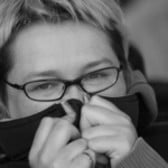
Natasha Poletaeva
45 years, Russia
5 Reasons Why Climbing Mount Elbrus Will Help to Reboot Your Brain and Mentally Reset
Just a couple of flight hours from Moscow you'll find Mount Elbrus, the highest summit of Europe. Climbing it will not only add points to your alpine experience, but also inspire to reboot of consciousness. And here is why.
1. You can expand the view of life
From the slopes of Elbrus you can observe the stunning panorama of the Greater Caucasus Mountain Range — continuous mountain ridge which stretches for more than 1,100 km. Elbrus, or Mingi-Tau (“the highest mountain” in Balkar) is the only summit on the continent that stand outside the ranges — a real Lonely Mountain, as if from Tolkien’s books. The gigantic perspective is so different from what you see every day on the way to office and back, that just looking at it can reload consciousness. It is simply impossible to meet such views and make such ascents in Europe. For example, the French Mont Blanc, which is sometimes mistakenly considered the highest on the continent, is only 4,810 meters high, which is almost a kilometer below Elbrus. So in comparison, the ascents that you made at home did not give and will not give you anything like that.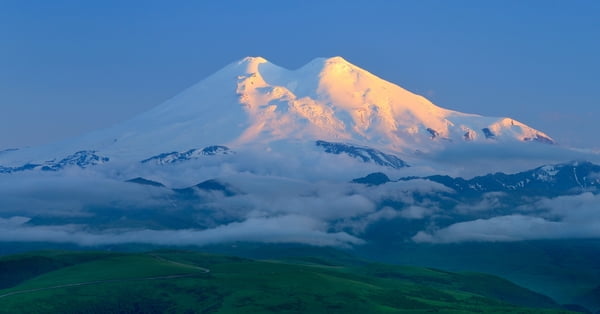

2. Climbing high volcanoes is different mountaineering, impossible in core Europe
Elbrus with its two impressive cupolas is an extinct stratovolcano, all the year round its slopes covered with snow and ice. Concerning volcano origin, Elbrus veteran climbers love to surprise beginners with stories like “Elbrus is about to wake up,” but this is not quite so.
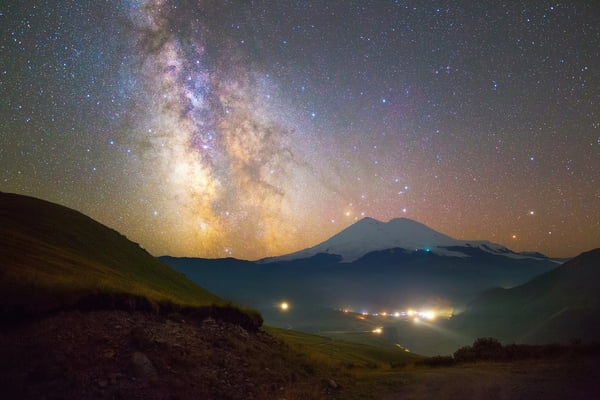
According to scientists, the last eruption of Elbrus took place about 900 years ago, and today there is little possibility of the resumption of volcanic activity (although there are opposing opinions). Though the remains of the volcano's “breath” are noticeable today: in certain areas you will surely smell the sulfur fumes.
Two summits are two former craters that formed the terrain of the mountain. Their height is 5,642 meters (West) and 5,621 meters (East). There is practice of climbing not only the highest point, but also the neighboring Eastern summit; this is available to people with good acclimatization and preparation. The so-called “Cross” is possible either: it is ascent from the south direction to the Western summit, overnight on a slope, and ascent to the East summit with following descent from the north side.
Climbing Elbrus is different mountaineering, not comparable with Alps (as well as Carpathians, Apennines or Pyrenees). This is not a rock climbing, but rather a meditative uprise through snow and ice. It is not very difficult technically, but demand your full strength and insistence: during quite diligent climb it is hard (if not impossible) to take the mountain “on the spur of the moment”.
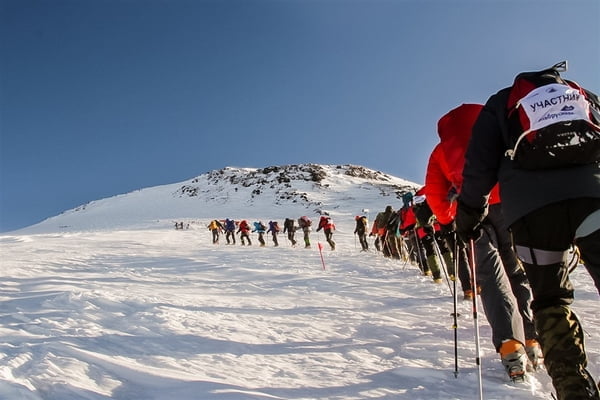
And here it is, the moment of reboot! In the course of ascent your consciousness will surprise you by the ability to move forward when the strength seemingly has dried up. The following “runner’s high”, while filled on the route, may be applied not only in alpinizm, but in everyday life: it is not a talent, it’s a skill.
This possibility are widely known among sportsmen: for several years now, Red Fox Elbrus Race — the stage of Skyrunning World Cup — take place on Elbrus slopes in May. For many athletes this is a good preparation for more demanding ascents.
3. Reboot thanks to altitude
As we mentioned before, Elbrus is the highest point of Europe — its ascent comes as the part of the “7 Summits” program and “7 Volcanoes on Seven Continents” (so after climbing, consider that it’s starting to hit the fan!).
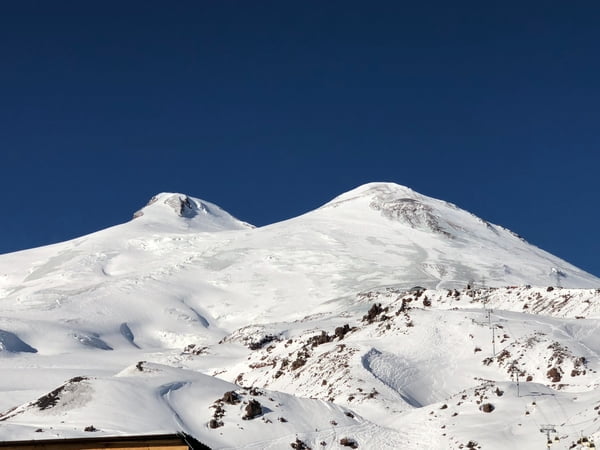
To climb Elbrus, you will definitely need acclimatization. And sure you will come across hypoxia, caused by a pressure difference at an altitude of 5,000 meters (partial pressure there is 100 hPa versus 200 hPa at a sea level).
And here is medical science opinion: with the lack of oxygen, the brain mobilizes and focuses, disabling high-runner excess processes. As a result, at the altitude you will definitely get rid of background thoughts, which are overwhelming in general; at the altitude the brain simply turn ‘em off.
On the climb you will experience the most complete and surprisingly effective focus on one action — to move forward. It's interesting, that this proficiency to focus will remain with you forever, with the possibility to apply it on a daily basis in ordinary life (that’s why there are so many scientists and top managers in the mountains).
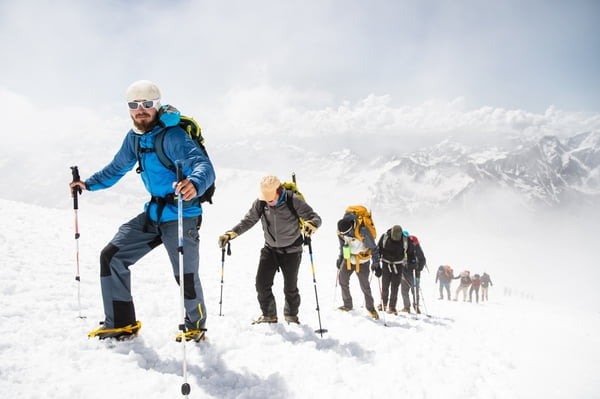
As an aftermath, the ascent will make you a different person: ready for more challenges both in terms of physical and mental health. And once you have mastered all the pressure at the summit, you will surely cope with the problems and stresses after climbing. The key is to acclimate properly, to listen to your body and follow the advices of the mountain guide.
4. Immersion into different culture
Elbrus is located in Balkaria, where you will encounter a completely different culture and environment (the only thing that seems familiar will be gondolas and snowcats). You sure enjoy another kitchen, another landscapes and another people, who speaks another language. In these parts if you literally move away from the asphalt road by 100 meters, you can adjoin the real, living, untouched wildlife, which is difficult to meet in the Europe in such volumes today. In order to see Elbrus from the sidelines, it is worth trekking or driving a few kilometers to the Cheget Meadow (the second mountain recreation and skiing area in the Elbrus region) and climb up to high-mountain cafe “Ai” (2,750 meters), where you can try national culinary feature “khichin” (closed flatbread with meat, potatoes, cheese or edible greens). Caucasian cuisine is simple, but surprisingly tasty. This is all kinds of kebabs, or grilled meat, vegetables; rich soups, dairy products. Above all praises is local river trout, and we recommend to eat it with herb-tea on the herbs that natives gather near the same slopes along which you are climbing or skiing. Once again, it is worth noting that such views are not to be found nowhere in Europe: for example, the famous Chamonix is located at an altitude of 1,000 meters above sea level. Azau Meadow is situated at 2,350 meters, and it changes everything: the transparency and clarity of air, the blueness of the sky and courage lines of the rocks. Compared to the “toy” beauty of Alpine landscapes, in the vicinity of Elbrus you feel yourself as if in the habitation of giants; and believe us, these impressions will stay for a long time, if not forever.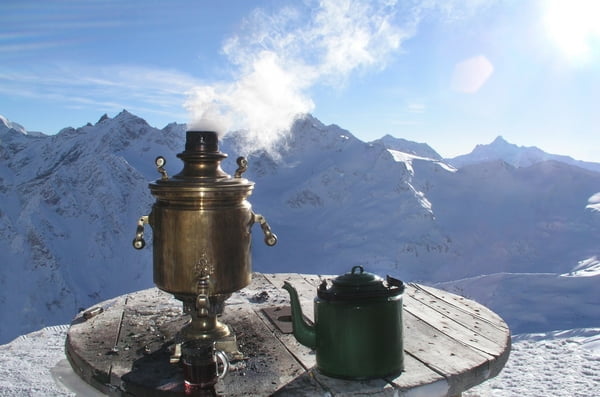
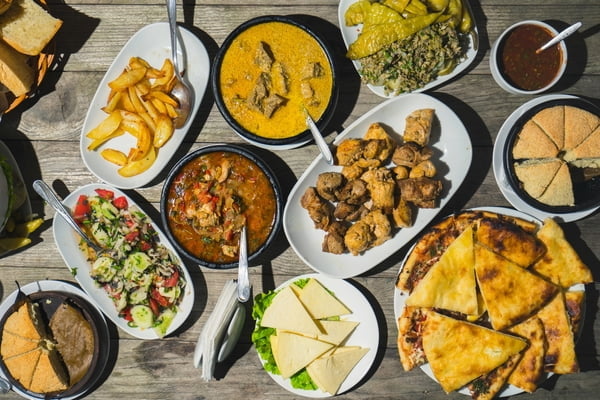
5. Run up the wall... and stay in comfort zone
We all play certain roles in this life. Role of child, husband, wife, mother or father; employee, business owner, friend… Climbing Elbrus will help to change both familiar environment and push the existing framework temporarily. During ascent you are an independent unit, a climber, a mountaineer. And if at work you solve various issues from morning to evening, while climbing Elbrus you have to do something completely different. Solve one big problem, which for several days will become the main one in your life. With such a situation, your head will clear up just in a few days. Also in order to immerse yourself into “the atmosphere”, you can arrange a digital detox (WI FI is common, but not at every point of the resort, — workaholics can buy a local SIM card with mobile Internet). By the by, during Elbrus vacation you better think about yourself rather than problems at work, and use your phone to shoot the beautiful views premier to business chats. INTERESTING FACTS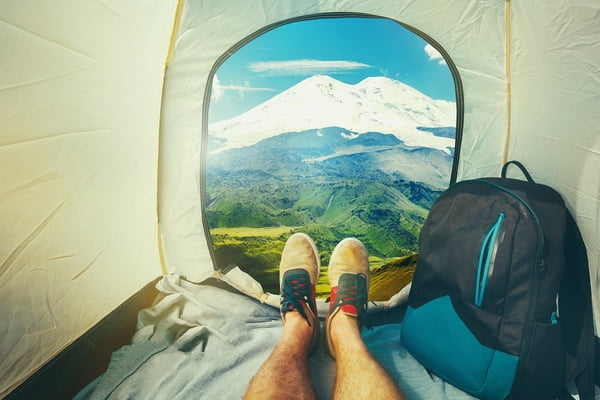
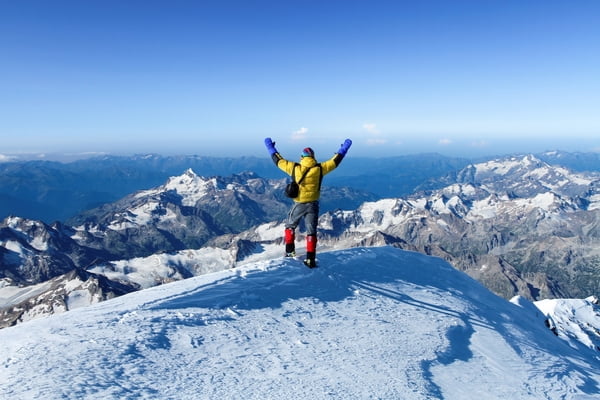
-
Trip to Elbrus is quite inexpensive. Euro exchange rate to Russian ruble is: 1 euro ~ 75 rubles, which is plus or minus equal to the price of a cup of coffee. Climbing with local certified guides costs about €1,000 per climb, and includes guide’s fee, accommodation, all visa issues, transfers and everything you need. Deposit some money on khichins and that's it!
-
You can get Russian visa easily. Its execution process, as well as other points of the trip, tour operator will take care of.
-
If you choose to travel to Elbrus Region through Moscow, Saint-Petersburg or Sochi, you can spend a couple of days on interesting excursions and get to know Russia more closely.
-
Best mountain guides are a Mountain Planet’s trademark. All the guides are the members of Russian Mountain Guides Association and have been trained under the Association of Canadian Mountain Guides standards.
-
Historical notes: according to several theories, Elbrus is considered as a “place of power”. Before and during the Second World War, there were searches for “secret entrances to Shambhala” there.
-
By some accounts, Zeus in Greek mythology chained Prometheus for stealing fire from the Gods to one of the Elbrus slopes.
-
There are something to do in Elbrus Region in addition to climbing: skiing or snowboarding, swimming in the natural hot springs of Jily-Su (“warm water” in Balkar); there are a lot of recreational trips to different lakes and waterfalls. All you need is ask your guide!
-
Promo code for discount is ELBRUS2019.

